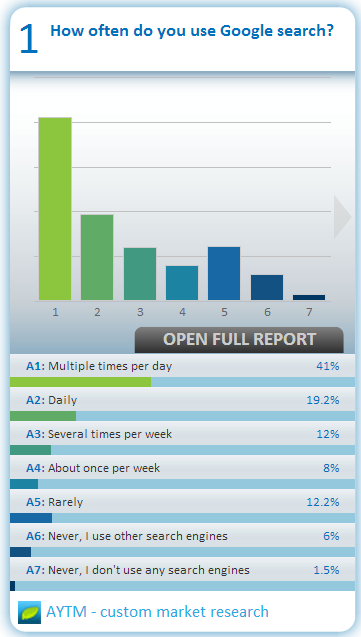Americans use search engines for product and service research at impressive rates. According to comScore’s latest qSearch data, more than 17.6 billion explicit core searches were made in December 2012 – an increase of 4 percent month-over-month. But how many queries turn into clicks for brands?
Google: Still king for SEO efforts
 Google – the clear dictator of search – held a 66.7 percent market share of U.S. searches, but both Microsoft Sites (16.3 percent, up 0.1 percent) and Yahoo! Sites (12.2 percent, up 0.1 percent) improved their reach in December 2012. The Ask Network totaled 3 percent of core searches, and AOL, Inc. reached 1.8 percent of searching U.S. internet users.
Google – the clear dictator of search – held a 66.7 percent market share of U.S. searches, but both Microsoft Sites (16.3 percent, up 0.1 percent) and Yahoo! Sites (12.2 percent, up 0.1 percent) improved their reach in December 2012. The Ask Network totaled 3 percent of core searches, and AOL, Inc. reached 1.8 percent of searching U.S. internet users.
Google accounted for the higher volume of online queries fielding 11.8 billion in the last month of 2012. Microsoft sites, like Bing, ranked second in query volume with approximately 2.9 billion searches, followed by Yahoo! (2.2 billion), the Ask Network (534 million) and AOL, Inc. (310 million).
Google – do people always click results?
It’s clear that Google reigns supreme when it comes to online searches, but do consumers actually feel Google’s SERPs provide them with greater insight than what Bing offers? According to Ask Your Target Market’s recent survey, 41 percent of respondents turn to Google for information multiple times per day. More, 19 percent of survey respondents indicate that they use Google search daily.
AYTM also discovered that about 65 percent of Google searchers sometimes find answers to their questions directly on SERPs, without having to click through to any website. Sixteen percent of users say they sometimes find answers in SERPs, and 19 percent say they never see answers before navigating through to another website.
Data also showed that only 14 percent of survey respondents always click links after conducting a search via Google. Fifty-eight percent said that they sometimes click links on SERPs.
To improve clickthrough rates and increase referral traffic, marketers must develop content marketing strategies that provide answers to searchers’ queries, and optimize media using SEO best practices. Insightful and straightforward headlines might appeal more to U.S. searchers, especially if internet users want to make the fewest number of clicks to find answers to their questions. Therefore, brands must develop Editorial Calendars to strategically plan the production of content that touches on consumers’ needs, questions and interests. A wide array of custom content will not only populate more SERPs, but showcase brands’ focus on becoming informational resources for their new and existing customers.




